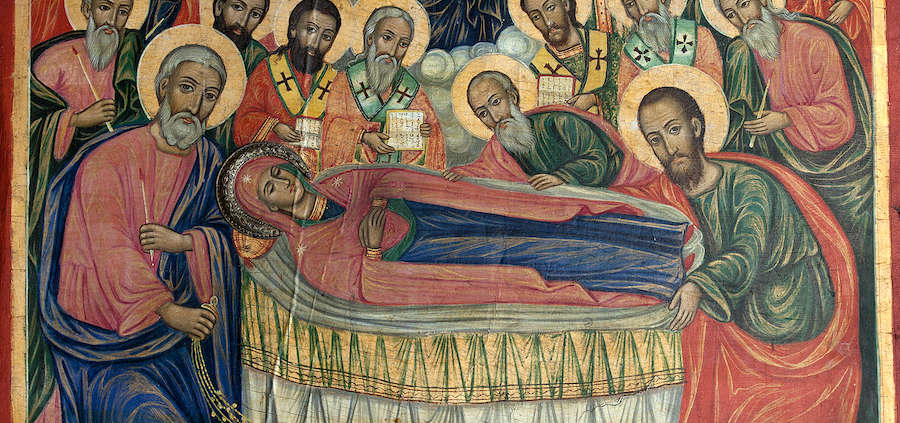“From the Death of Mary” by Rainer Maria Rilke
1.
The same great angel, who once
Brought her the message of birth,
stood waiting to notice him,
and spoke: Now it’s time for you to appear.
And she was as frightened as before and proved
herself to again be the virgin, deeply affirming him.
But he shone and approached infinitely,
he vanished as if in her face—and told
the converts who had gone out
to come together at the house on the hillside,
the house of the Last Supper. And they came
fearfully and entered anxiously: she lay there,
in mystery, in decline, and immersed
in her election, along the narrow bed,
quite intact, and listened to the angelic singing.
Now that she saw everyone waiting,
behind their candles, she tore herself
from the overwhelming number of voices
and heartily gave away the two shawls she owned,
and lifted up her face to this one and that one . . .
(Oh, origin of nameless torrents of tears).
But she lay down in her weakness,
and drew in the heavens so close,
so close to Jerusalem, that her soul
only had to stretch a little as it emerged:
already he raised her, who knew
everything about her, into their divine Nature.
2.
Who considered until their coming
the many heaves were incomplete?
The risen one had taken a seat,
but next to him, for twenty-four years,
the seat was empty. And they were already
beginning to get used to the pure gap,
which seemed to have healed, because it was
filled by the streaming radiance of the son.
So she, who entered the heavens,
did not approach him, as much as she wished;
there was no space there, only he was there
and shone with a radiance that pained her.
But now that she, the touching figure,
joined the new blessed, and placed herself
inconspicuously, light to light, an interval
of such brilliance erupted from her being
that the angel she illuminated and made
dazzling cried out: Who is she?
All were amazed. Then they all saw
how God the Father behaved above
our Lord, so that, surrounded by sublime
twilight, the empty space appeared like
a little suffering, a trace of loneliness,
like something to be endured,
a remnant of earthly time, a dry heart—.
One looked at her, she looked anxiously,
bent far forward, as if she felt:
I am his longest pain—: and suddenly fell forward.
But the angels took her up
and groomed her, and sang joyously,
and carried her farther, one the last piece more.
3.
But before Thomas the Apostle,
who came too late, the swift one arrived before
him since long ago the angels appeared to take command
at the mountain grave site:
pushed the stone aside. You’ll want to know
where is the one who moves your heart:
Yes: she was laid in there
like a lavender pillow for a while,
that the earth smells of her in the future like
the folds of a fine shawl.
All death (you feel everything), all ailing is
numbed by her fragrance.
Look at the shroud: where is it bleached,
where does it becomes dazzling, and does not fade?
The radiance emanating from this corpse made
it even clearer than sunshine.
Don’t you marvel at how quietly she slipped away?
Nothing has been shifted, almost as if she still were. But
the heavens are shaken above:
man, kneel down and watch with me and sing.
– Translated by Wally Swist
Wally Swist’s books include Taking Residence (Shanti Arts, 2021), Evanescence: Selected Poems (Shanti Arts, 2020), and On Beauty: Essays, Reviews, Fiction, and Plays (Adelaide Books, 2018). A Writer’s Statements on Beauty: New and Selected Essays and Reviews was published by Shanti Arts in 2022. His latest collection, Aperture, was recently published by Kelsay Books.





Leave a Reply
Want to join the discussion?Feel free to contribute!